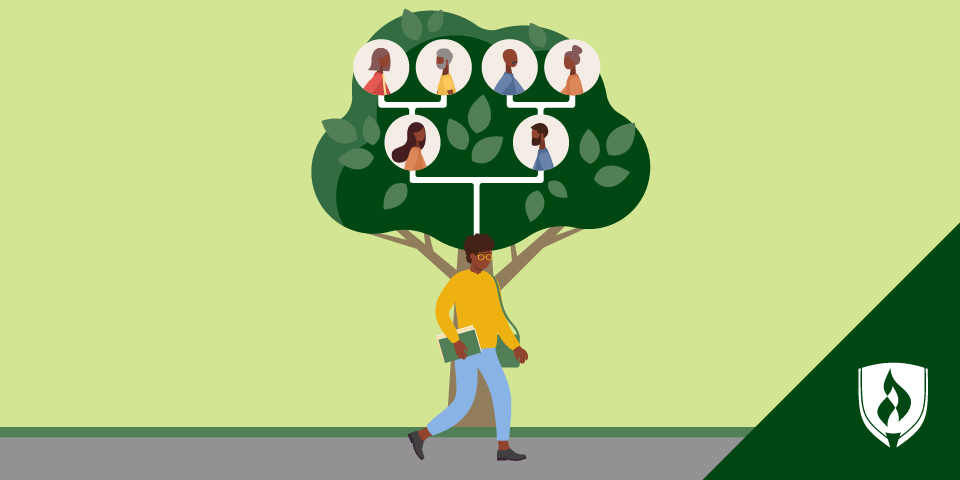
Whether you’re the class valedictorian or the class clown, the language of academia can be bewildering. In the swirl of documentation and strangely-named departments, everyday students are just trying to navigate their courses and figure out their track to graduation.
You need a lot of practical know-how to navigate higher education. And if you’re a first-generation college student, you navigate that world without the benefit of your parents’ college experience for context.
First-generation students made up more than 50 percent of the U.S. college population in 2016, and universities have recognized that first-gen students are more likely than their continuing-generation peers to drop out of their academic programs.1,2
That’s obviously not an ideal statistic for anyone to be a part of, but of course, data isn’t destiny. If you’re a first-generation college student, there are things you can do to help navigate some of the unknown and position yourself for academic success—and we’re here to help with that. Let’s dive into some of the things you should know as a first-generation student.
6 Things first-generation college students should know
1. You are not alone
You might look around your college auditorium or pop onto a discussion thread in your online class and feel completely alone in your confusion. Everyone else seems to know what they are doing, and maybe you feel pressured to seem like you do too.
In reality, everyone struggles with the adjustment to a college program at some point. There’s a lot happening behind the scenes in terms of students seeking support, counseling, tutoring and more. Students are often amazed at how helpful it can be to work with a tutor—or even with someone who can show you how they log into different platforms, make use of the library or add a course to their schedule.
“Each year, we receive literally hundreds of positive survey comments from students who just finished meeting with a Peer Educator or Peer Tutor,” says Jon Mladic, dean of Library and Learning Services at Rasmussen University. Mladic explains that peer support teams can be especially encouraging because they help students navigate practical concerns while also truly relating to the learning curve.
“Sometimes, students just need to hear from someone else who has been in their shoes and knows how to overcome the challenge they’re facing,” Mladic says. Utilizing student support resources is one thing universities expect, but that might not always be obvious to students.
A survey from the Center for First-Generation Student Success found that only 55 percent of first-gen freshmen students sought academic advising in their survey group—compared to 72% of continuing-generation students.3 First-gen students were also less likely to utilize academic tutoring and other support services.
This suggests that more continuing-generation students know about these resources and seek them out—so take a page from their book. Think of it this way: you’re paying for the support services as well, so why turn it down? Do you typically refuse the complimentary bread basket at a restaurant? Probably not.
2. Get a support system in place as soon as possible
Many students (first-gen and continuing-gen alike) make the mistake of waiting until they are underwater to reach out to student support services. By then, with the end-of-class deadlines pending, there aren’t as many options to recover.
Anticipate future speed bumps by getting connected with support services right away. You don’t have to keep anything going if you realize you don’t need it. At Rasmussen University, Mladic explains that early connection is built into some of their student resources.
“Peer Educators begin working with students prior to the beginning of classes,” Mladic says, explaining that they help newer students navigate online courses, access digital content for assignments, locate the online library and find APA resources. “In short, they can help you focus more on your courses and assignments when classes begin.”
“It’s completely normal to be nervous about starting,” Mladic says, encouraging students to connect with resources as soon as possible. “You aren’t in this alone.”
3. Take advantage of mental health services
The importance of mental health for your success in a degree is pretty huge. Students have the same mental health needs as the rest of the population. For first-generation students, the psychological burdens can be even heavier.
“With a large amount of pressure on first-generation students to succeed, knowing their parents did not have the opportunity that they have, these students often face a sense of unworthiness for attending college,” says Jennifer Lee Magas, employment law attorney and English professor at Fairfield University. She goes on to explain that feeling like an outsider or imposter is another common reaction.
It’s typical to see colleges offering mental health and counseling services. Some institutions also utilize mental health apps to help students manage their mental health needs. For example, Rasmussen University students all gain access to Togetherall®—an app moderated by mental health professionals that allows students to connect with peers, take assessments, post a creative journal, find resources and more.
4. Connect with people
You may be thinking you enrolled in a program to make your way toward a career, not to make friends. But peers can help you when you need a quick answer about a confusing element of a class. They can become a valuable career network after graduation. And last but not least, they can make you laugh about the stressful parts of college and broaden your understanding of the world.
This is even more important for first-gen students who don’t have as much experience with the ins and outs of college coming from their parents.
Connect with other like-minded students, join support groups or get involved in extracurricular activities. The extra support you’ll receive from the relationships you build is invaluable, and it will do a lot to help you feel more adjusted to your new surroundings.
5. Get serious about finding financial aid
College is expensive, and first-, second- and third-generation students alike may work while attending classes. Many students, especially those who aren’t getting financial aid advice from their parents, miss out on valuable opportunities. Check out “ Your Most Pressing Financial Aid Questions Answered” to see an example of what you can look into to potentially make college more affordable.
Asking the financial aid office at your university could also give you some great ideas. Do your homework in researching scholarships you might qualify for because every little bit helps.
6. Consider your approach to time management
“One challenge most students face is time management—fitting the time it takes to be a successful student into their already busy schedule,” Mladic says. Mladic points out that college course schedules don’t just impact students but their families and friends also. “It can easily feel overwhelming.”
One way to adjust to the new schedule is to hear from other students about how they manage their time. Mladic says talking to a Peer Educator or Peer Tutor can help students wrap their heads around the balancing act in a sustainable way.
“For the students who find themselves in classes with a higher-than-expected rigor, it is important for them to prioritize the time it takes to achieve their desired goals,” says Tosin Williams, founder of Learning Period. “I’ve seen many, many students fall into the trap of thinking ‘I’ll just study more’ without making an effort to sit down with a calendar and map out exact times.”
Organizational skills can truly make or break any student’s college experience. You’d be surprised what a little preparation and a lot of determination can do!
Blaze your trail
First-generation college students face their share of challenges, but they also bring their fresh perspectives to the university they choose. It’s in every institution’s best interest to make the confusing or unspoken expectations of their process clearer. And many schools do so by offering support services.
Taking advantage of those services is half the battle. When you connect with the people who understand academic resources best, you are setting yourself up for success.
If you’d like to learn more about some of the helpful resources available to Rasmussen University students, check out “ 12 Surprising Student Resources You Didn’t Know Rasmussen University Offered.”
1"First-generation College Students: DEMOGRAPHIC CHARACTERISTICS AND POSTSECONDARY ENROLLMENT,” Center for First-Generation Student Success, 2018. [Accessed November 2022], https://firstgen.naspa.org/files/dmfile/FactSheet-01.pdf. This fact sheet uses the following definition of first-generation student: a student who had parents who did not have a bachelor's degree.
2Emily Cataldi, et al. “Stats in Brief – First-Generation Students: College Access, Persistence and Postbachelor’s Outcomes,” National Center for Education Statistics, U.S. Department of Education, Feb. 2018. [Accessed November 2022], https://nces.ed.gov/pubs2018/2018421.pdf.
3"Use of Student Services among Freshman First-generation College Students,” Center for First-Generation Student Success, 2014. [Accessed November 2022], https://firstgen.naspa.org/files/dmfile/NASPA_FactSheet-03_FIN.pdf.
Togetherall is a registered trademark of Health Parity Holdings LLC.




